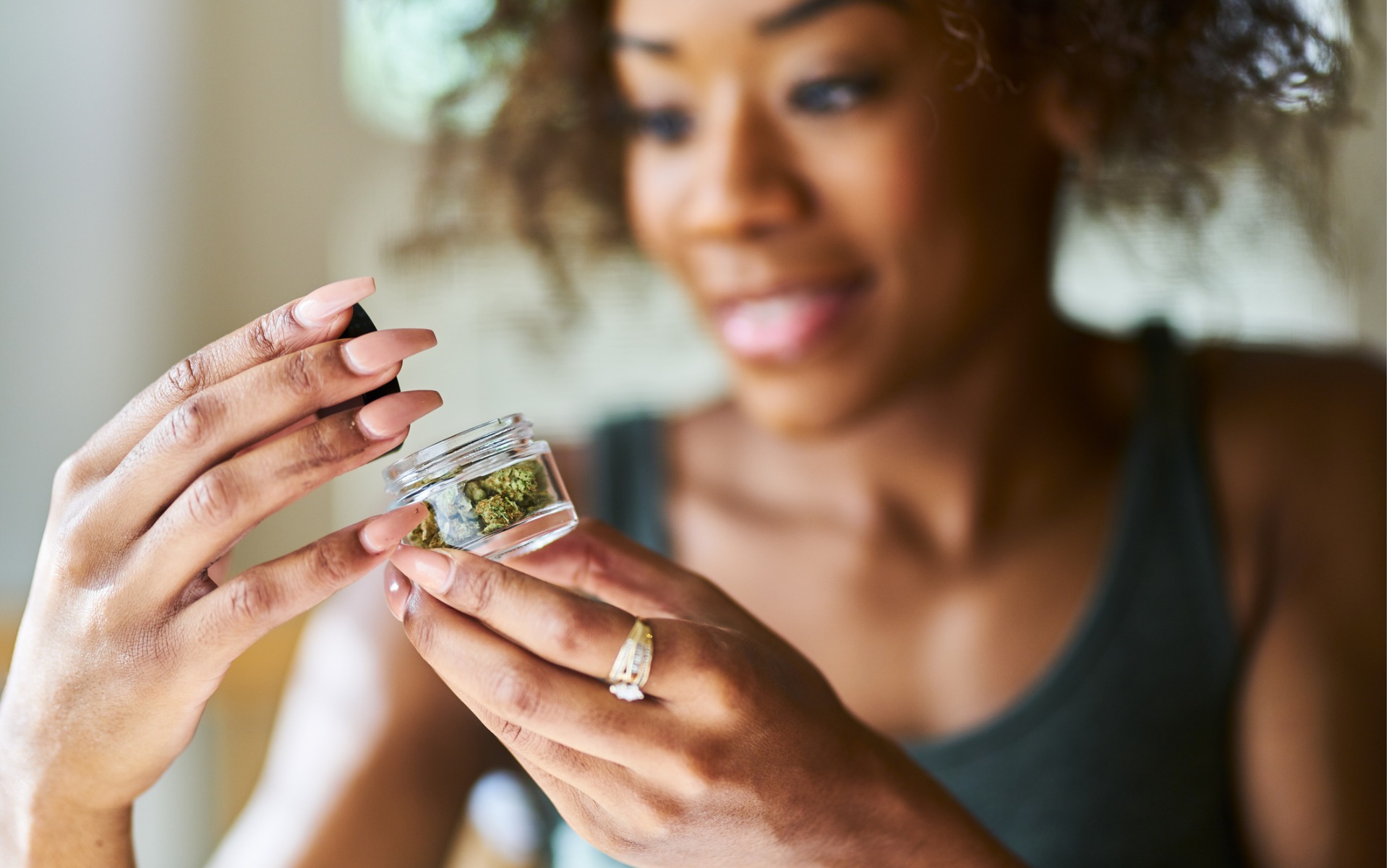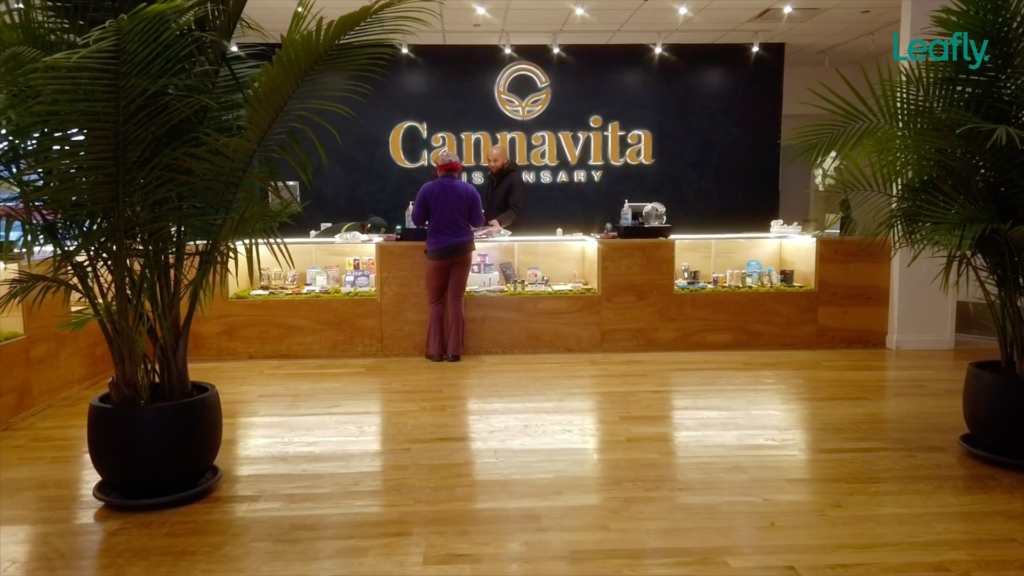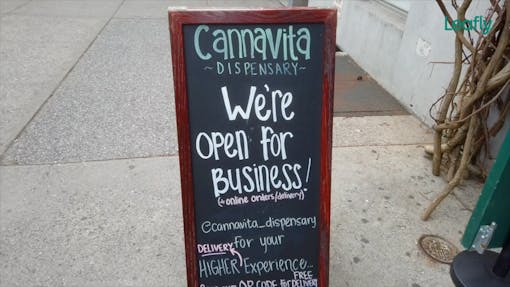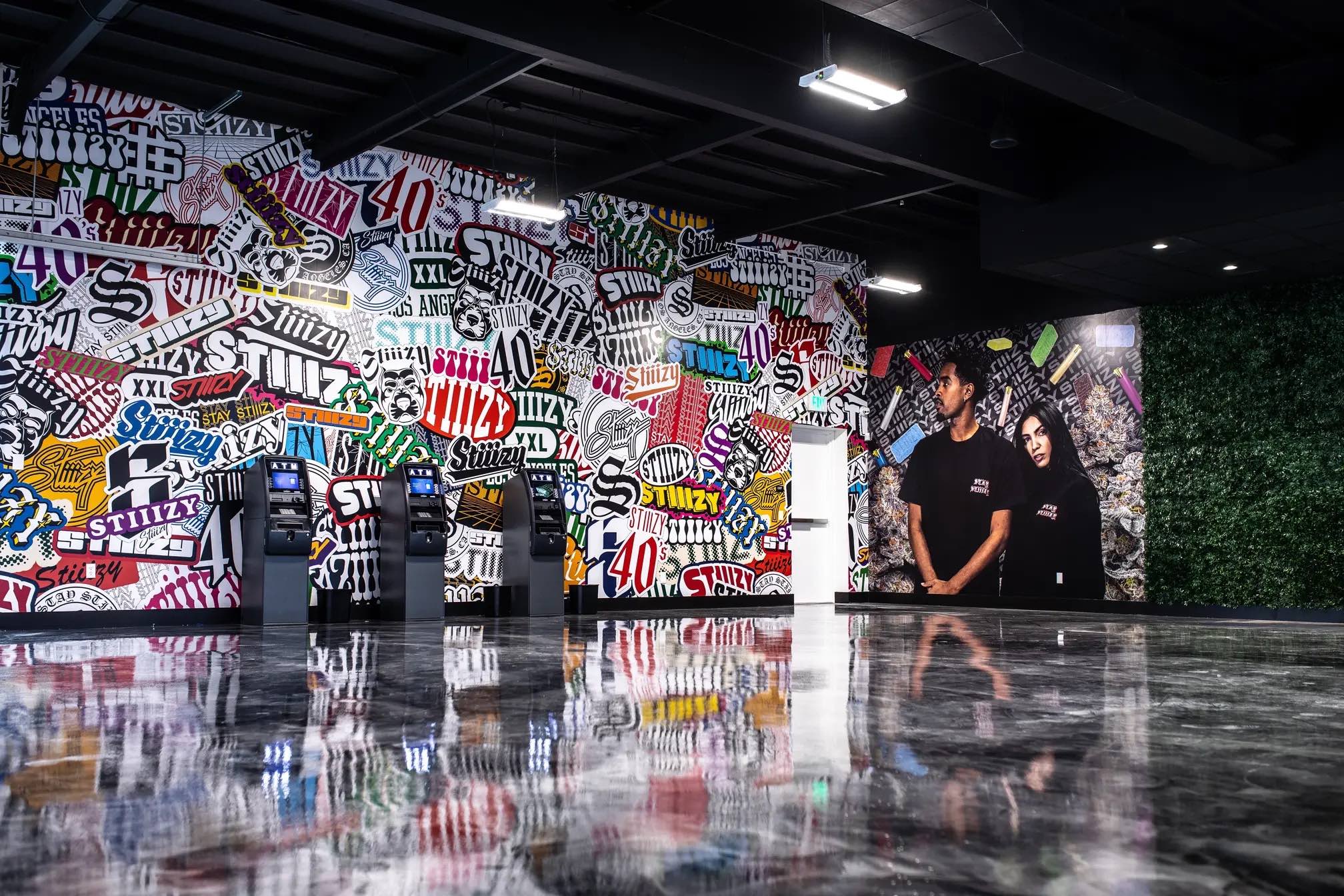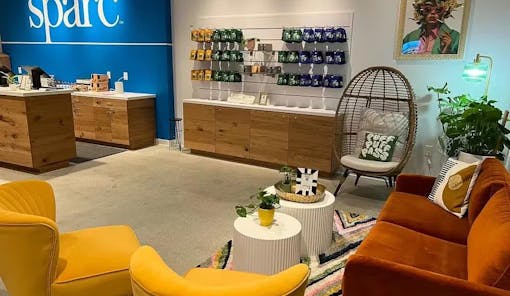Here are Leafly’s 66 women-owned and operated companies to watch this year and beyond.
Do you believe only 20% of cannabis companies are women owned? It’s true. That’s only 1 out of 5. And according to a report by MJBiz, the number of women in cannabis businesses is actually decreasing.

Only 10% or less of businesses in Massachusetts and Ohio qualify as women-owned. So while the cannabis plants that we all love to consume are all female, women are being left out of ownership roles in the industry the at large.
To eliminate any excuse for “not knowing” any women-owned companies to support, we’ve compiled a list of 66 to explore throughout this year. They’re broken up into three categories: Brands, license holders, and non-plant touching companies that specialize in accessories, services, and community-building.
Top women owned cannabis brands in 2023

These 24 women-driven brands are on the rise. Keep an eye out for them to make even more noise on the national stage in 2023.
Dose of Saucy
Dose of Saucy is a Black woman-owned company that specializes in creating delicious THC-infused sauces & condiments. Despite the brand being based in California,Tess Taylor, founder of Saucy, is shamelessly Texan to the core and we love it. It’s hard to miss the cowgirl details all over Saucy’s brand. Their signature Sweet Heat Texas Style BBQ Sauce is a perfect blend of tangy, smoky, and sweet flavors that can enhance your high & the taste of literally any foods you want. If you’re looking for an extra spice, you’ll have to try their Mama T’s Southern Hot Sauce.
Gift of Doja
Gift of Doja is a women of color created cannabis equity brand, specializing in honoring the vibe of all beings and all things. curating cannabis flower and products based on their unique Appellations of Origin, soil care and thoughtful cultivation process by the farmers. Gift of Doja factors in the terpene profiles, which are the essential oils produced by the plant, as well as the cannabinoid content; which are the compounds that make a person feel lit; into the curation process, ensuring that the consumer has a unique experience with every jar.
xula
Based in Mexico City. Organically grown in the USA. Karina Primelles and Mennlay Golokeh Aggrey are the dynamic duo leading xula, a Latin and Black-owned CBD brand. xula intersects their herbal index featuring ingredients like black cohosh root, motherwort, and kava root with a cannabinoid-based approach to women’s health. Xula has recently collaborated with fellow woman-owned brand, Barbari, to create the Period Daze Spliff to help with mother nature’s monthly gift.

CAM
Anna Willey is the owner of CAM (California Aristinal Medicine), a Sacramento based cannabis cultivator and delivery company. As a Sacramento-based cultivator, CAM has carved their own recognition and affinity among reputable brands like Connected California, Alien Labs, and Doja Pak. From Biscotti Otti Otti to Kush Mints, CAM’s selection, quality, and variety of flavors is a testament to their dedication to cannabis enthusiasts and the culture.
Shop highly rated dispensaries near you
Showing you dispensaries near
But A Cake
A pastry chef by trade with over 15 years of experience in food and health regulation and compliance. ButACake, an infused edibles cannabis brand with a strong and established legacy market, hemp and adult use cannabis following With An Associate of Arts and Sciences (A.A.S.) degree in Baking and Pastry Arts from Le Cordon Bleu Institute of Culinary Arts Graduating Class of 2010, ButACake takes the CAKE in 100% handmade from scratch treats. ButACake is a cannabis brand specializing in educating and feeding consumers on the benefits of alternative cannabis consumption.
Miss Grass

Miss Grass is a long-time digital community turned full-fledged national brand founded by Kate Miller and Anna Duckworth. Miss Grass was created to ensure women have a community where they can access cannabis safely, thoughtfully, and intentionally. You can get your hands on Miss Grass pre-rolls and flower in states like California, Massachusetts, and now in Kate’s home state of New Jersey.
Pleasure Peaks
Pleasure Peaks is a cannabinoid sexual health company that creates cannabis-infused sexual wellness products like their infused sexual lubricant. The company was founded in 2019 by Antuanette Gomes and is 100% Black, female, and LGBTQ owned and operated. Pleasure Peaks offers a variety of products beyond their signature cannabis-infused lubricants like massage oils, arousal sprays, and bath salts. In Canada, Peak Pharms Labs the sister company that has is launching their THC line of suppositories available in Canada.
dreamt

Founded by two science minds, Carolina Vazquez Mithcell and Dr. Jannise Babbush, dreamt is a California-based brand with the mission to tap into cannabis’ potential as a sleep aid. Dreamt offers a variety of products, including cannabis-infused tinctures, capsules, gummies, and vapes that are specifically formulated to help you unwind and drift away. This is the first brand from Ciencia Labs, a female & minority-owned company based in Los Angeles that produces a house of cannabis brands including Luchador gummies.
Potli
Potli is a woman-owned cannabis company that specializes in creating premium, hemp-derived CBD-infused pantry staples like honey, olive oil, chili oil, and apple cider vinegar. Founded in 2017 by Felicity Chen and Christine Yi, Potli’s mission is to make high-quality CBD products accessible to everyone. Small, family-run farms in Northern California are the source of Potli’s CBD, and the company is dedicated to adopting sustainable and organic methods throughout its entire supply chain.
GUMBO Brands

Alexis Major-Allison is the co-founder and COO of GUMBO Brands, one of the fastest brands that has partnered with Cookies to launch in a wide-range of stores across the country, including Cookies’ newly opened Thailand dispensary. Alexis and her partner Karim Butler (aka Luka Brazi) have been hustling to impact the industry with their strain and roster of celebrity affiliations like Moneybagg Yo, Meek Mill, and their own GUMBO Radio slot on New York City’s Hot 97 FM radio station.
Related
28 grams of game: GUMBO’s Luka Brazi breaks down his NYC come-up
Renegade Piranha
Renegade Piranha is a self-made weed roller to the stars. Other clients include Kid Cudi, Jadakiss, Drake, Madonna, Rihanna, and JR Smith. Oh, and the infamous Elon Musk smoking meme? She rolled that joint. Piranha got the gig in 2016 through a mutual friend who was growing with Snoop’s cannabis soil company, Snoop’s Premium Nutrients. They wanted to gift Snoop weed grown with his product, rolled and ready to puff. In order to enter Snoop’s inner circle, she had to show her stuff in a roll-off with two other contenders, including a sound engineer who came at Snoop’s recommendation.
Related
Snoop Dogg’s top blunt roller is a woman
The Congo Club
The Congo Club was founded by Amber Senter, cannabis pioneer, equity advocate, and co-founder of Supernova Women, an organization formed by and for women of color to foster community empowerment in the cannabis economy. The Congo Club is one of the few places that carry the Red Congolese: an heirloom strain, which provides an electrifying, thought provoking and optimistic high. Considered to be one of the most sought-after Bay Area strains, it’s truly one not to be missed.
Barbari
Originally from Oregon, Meryl Montgomery and Valerie Sakota are co-founders of Barbari, an herbal blends brand. Barbari walks a path for both THC and CBD flower options mixed with herbal smoking blends made from a variety of natural ingredients such as marshmallow leaf, mullein, and lavender. Barbari products are made for conscious wellness and do not contain any tobacco or nicotine, making them a healthier alternative to traditional smoking.
Love Herb
Erinique Owens, founder, is bringing adaptogens to CBD with her Love Herb brand based in California. Erinique turned to CBD during her long quest to overcome a range of medical concerns, including insomnia and chronic back pain. Tired of treatments that cost too much and didn’t quite work, she began consuming different doses and formats of CBD, adaptogens, and other herbal remedies. Love Herb aims to provide feel-great solutions through cannabis and medicinal mushrooms, creating a mainstream awareness of the positive impact they can have on mind & body.
Kush Queen
Kush Queen is a California-based cannabis brand founded by Olivia Alexander in 2015. With award-winning products in both their transdermal patches and their bath bomb, Kush Queen knows wellness. Since launch, Kush Queen’s bath bombs have become the number one cannabis bath bomb in the game created with both THC and CBD formulations.
Astral Treats
Elle Rahman is the co-founder of Astral Treats, a uniquely cosmic edibles brand launched in Oregon in 2020. Working with her partner Kevin Collins, the Astral Treats team has been able to create their one-of-a-kind star shaped gummies with tropical, refreshing flavor profiles like Dragon Fruit, Grapefruit, and Lychee. Next time you’re in Oregon, support a woman-owned brand.
Sheba Baby!
Sheba Baby, a new wellness-centric cannabis brand is being launched by long-time industry leader, Mary Pryor. Debuting in New York & California, Sheba Baby follows the motto “self care is a habit” with a heavy foundation on integrative wellness. Expect pre-rolls, lip care, retail experiences, and more from Sheba Baby that blend holistic ingredients like sandalwood and peppermint to compliment joints infused with THC-A.
Flower By Edie Parker
Brett Heyman, founder of Edie Parker, has built one of the most recognizable cannabis fashion brands in the industry today. With a chic high-end aesthetic, Edie Parker makes their lane for women who want fire weed in a fire handbag.
Pwincess Cutt by Queen Pee

The vision for the booming Joke’s Up Ice Kream store in Studio City came from Queen Pee, a marketing maven with a best-selling brand in California’s Cookies stores. She found the Ice Kream location while knocking on doors in search of new stores to carry her Pwincess Cutt strain, which comes in a diamond-shaped bag.
Related
First toke: Joke’s Up Ice Kream dispensary grand opening taste test
Her Highness NYC
Luxury cannabis meets a female-forward approach. Her Highness NYC co-founders, Allison Krongard and Laura Eisman, have dedicated their career to creating innovative cannabis products that engage “harmoniously with the female body”. From THC to CBD to witty accessories, in Her Highness, you can trust.
Sonder Time
Faun Chapin and M. Paradise are the masterminds behind California-based brand, Sonder. With roots in the industry, Faun is a second generation cannabis entrepreneur who’s mother actually cultivated cannabis in Mendocino County. Initially known for their Sonder Space Crystals (aka pop rock-esque candy), Sonder has since focused on sharing the highest quality sungrown cannabis oils.
Substance
Reparations through cannabis brought to you by Sharoz Makarechi and Substance, a premium pre-roll brand. Sharoz has committed to the social impact as a true core of the brand. Substance is putting their money where their mouth is by donating $8.46 per pack of pre-rolls sold to organizations fighting to end mass incarceration.
Node Labs

Lauren Avenius is CEO of Node Labs, which works with Compound Genetics and other top breeders to develop and preserve the world’s best strains. “If breeders are the artists, Node is the recording studio,” Avenius told Honeysuckle last year. Node and Compound run a state of the art facility deep in the NorCal mountains that harbors hundreds of prized genetics at any given time. Node is the licensor and plant-touching home of Compound, facilitating game-changing collabs with everyone from Berner to Wiz Khalifa to 2 Chainz, pushing the plant’s creative limits with every node.
grown

Shannon Allen founded this Miami-based CBD based business that’s flying off the shelves. Known as CEO and “Grownwoman,” Allen ensures that grown only serves real, slow-cooked food. With locations in South Miami, Miami Gardens, and Flamingo Point, grown’s menu offers organic fast-food focusing on nutrient-dense, farm-to-fork cuisine. Allen oversees grown’s extensive farm network to source organic local and sustainable ingredients without GMOs, preservatives, hormones, or processed sugar.
License Holders

These women in cannabis secured licenses to grow, sell, or distribute the plant in legal markets. Support these 19 licensed operators and watch out for the next big moves.
Blossom Flower (MA)

Blossom Flower is a cannabis delivery company founded by Damaris Aponte, a Puerto Rican social equity operator who is bringing cannabis to her hometown of Holyoke, MA. After achieving licensing for cultivation, manufacturing, and delivery, Damaris is on her way to get Blossom Flower delivery operational in 2023.
Coast Cannabis Co. / T. Bear Inc. (MA)
T. Bear Inc. more widely known as Coast Cannabis Co. is the first independent product manufacturer in the state of Massachusetts and one of the first women-led manufacturers ever licensed for adult-use on the East Coast. Co-founded by Angela Brown in 2017, Coast Cannabis Co. are crafters of the finest chocolates, gummies, and vapes in the Bay State.
Mary & Main (MD)
Mary & Main is a family-owned & women-owned dispensary by mother-daughter duo Dr. Octavia Wiseman and Hope Wiseman. Based in Prince George’s County, Mary & Main is one of the only Black women-owned dispensaries operating in the state since 2018 and one of the first ever Black women-owned dispensaries to open up on the East Coast.
Holistic Solutions (NJ)
Suzan Nickleson is the founder of Holistic Solutions, cannabis history’s first Black woman owned dispensary in New Jersey. Located 45 minutes from Atlantic City, Holistic Solutions is an adult-use cannabis retail store that is officially open to all adults over the age of 21.
Queen Mary (CA)
Queen Mary is one of California’s most authentic cannabis brands focused on combining daily supplements and vitamins within a fast-acting, rosin infused edible experience. Tiana Woodruff is California native, founder of Queen Mary, and Tier 1 social equity applicant whose working towards launching her own cannabis retail store.
Earth & Ivy (NJ)
Earth & Ivy is a new adult-use cannabis dispensary licensed in Rutgers University’s hometown of New Brunswick, New Jersey. Sasha Stephens, Co-founder of Earth & Ivy, very well might be the youngest Black dispensary owner in the country. As an UPenn graduate, Sasha discovered her passion for the plant going from home grow to cultivation facility before joining her partners to successfully apply for a retail license.
Josephine & Billie’s (CA)
Whitney Beatty is the rockstar mom & entrepreneur who founded Josephine & Billie’s, Los Angeles’ first dispensary dedicated to women of color. As a lifelong cannabis advocate and board member of SuperNova Women, Whitney Beatty started her cannabis career launching The Apothecarry, a high-end humidor for your cannabis goodies. Josephine & Billie’s is an immersive experience designed as a 1920’s speakeasy giving ode to the Harlem Renaissance.
Khemia (CA)
Rose petal joints, THC infused hot cocoa mix, and the finest flowers are the signature products of Khemia, a California women-owned social equity cannabis manufacturer. Established in 2017, Khemia is led by a trio of cannabis lovers in Manndie Tingler, Mindy Galloway, and Kimberly Cargile with an impressive supporting cast of female advisors.
Tricolla Farms & Bardo Labs (NY & PA)
Tricolla Farms is New York’s very own sun-grown cannabis & hemp farm in partnership with their sister company, Bardo Labs – a boutique extraction lab. Tricolla Farms is family-owned and powered by a strong team of women entrepreneurs led by co-founder Britanny Carbone, Tia Tagliaferro, and Hayli Weintraub.
Etain (NJ & NY)
Etain is a family-owned, vertically–integrated cannabis operator based in New Jersey and New York since 2015. Founded by a C-suite of women leaders, the Peckham sisters (Amy, Keeley, and Hilary) began their journey creating plant medicine after seeking cannabis’ medicinal properties for their grandmother’s ALS.
True Labs (NJ)
A majority of cannabis licenses are for growing or selling, but who’s actually testing the product we consume to create a safe, transparent experience? Meet Sarah Ahrens, owner of True Labs, the first certified woman-owned cannabis testing laboratory on the East Coast.
Simply Pure (CO)
Wanda James & Simply Pure in Denver, Colorado is forever in the cannabis history books as the first Black (legal) dispensary owner. Shoutout to all the legacy trappers that paved the way. Since 2010, Simply Pure has been a staple in the Denver community and an icon of excellence for women and minority business owners across the nation. Stay tuned for the continued legacy of Simply Pure with new partnerships expansions to New Jersey.
Sixty Four & Hope (CA)
Sixty Four & Hope is a Black woman-owned social equity dispensary located in the heart of Los Angeles. Aja Allen is rooted in her work as a community advocate, and has been running her own social impact organization called ProjectC3 that supports homeless persons. Stop in and you’ll see Sixty Four & Hope has a curated collection of the best BIPOC and LGBTQIA+ brands California has to offer.
Soulstar & Nightjar (CT & NJ)
Amanda Rositano is the CEO of Soulstar, a female-led cannabis company led by an all-star lineup including Kim Napoli, Fran DeRogatis, and Katie Covett. Soulstar is the parent company and name of their Connecticut social equity cultivation license while Nightjar is the name of Soulstar’s upcoming New Jersey dispensary.
WYLLOW (CA)
WYLLOW is a new Los Angeles-based bi-cultural, woman-owned dispensary founded by Camille Roistacher. Debuted in 2022, WYLLOW began as a cannabis brand and has extended into a full-fledged retail store. WYLLOW’s storefront is highlighted as one of the most unique, immersive dispensary experiences through vibrant LED lighting, ASMR ambiance of your favorite cannabis sounds, and even a terpene smelling station.
Posh Green (CA)
Posh Green is San Francisco’s first social equity, independently owned dispensary by a woman of color. Inspired by owner & SF native Reese Benton’s in-depth fashion experience, Posh Green has dubbed itself as a “cannabis boutique” for top-shelf premium products.
Ganja Girls (MI)
Have you ever heard of a “Licensed Marijuana Event Organizer”? Yes, in many states you need a cannabis event license in order to (legally) allow consumption. Meet Morgan Underwood, Founder of Ganja Girl, the first woman of color to hold a state-issued cannabis license in Lansing, MI. Morgan started her career as cultivator supporting local medical patients, and now is providing safe and accessible consumption experiences to the Great Lake State.
Seventh Wave (CA)
Seventh Wave is the first licensed, dual-social equity cannabis company based in Humboldt County, CA. Co-founded by Eliza Espinoza and her husband Timo Espinoza, Seventh Wave is family-owned and licensed for bulk wholesale, manufacturing, distribution, and delivery retail. This family has a long storied heritage in cannabis as Timo’s father was set up by the FBI for cannabis in the 1970’s. Today, Seventh Wave is creating their own transformative legacy.
Four Twenty distribution and Mother Exotic Flower (CA)
Sakara Barnes runs two California businesses that combine to form a powerful operation. The New York native specializes in premium flower that is white-labeled and delivered with partners like Australian brand Stoned Apes, and delivery service See Canna. Looking forward, Barnes plans to work with Cookies, Seed Junky genetics, and Backpack Boyz soon.
Accessory, Community, & Service-based Companies

Businesses that don’t touch the plant directly are still essential to the industry’s growth. These 23 women-led businesses give life to the ancillary fields of the plant.
Black Girls Smoke
Black Girls Smoke (BGS) is a community dedicated to women of color in cannabis. Led by the initial vision of Vic Styles, the BGS team is driven by teammates Ashley Cadogan (Social and Community Manager), Kyla Mayo (Director of Innovation), Crystal Castillo (Partnerships Manager), and Jayson Paulino (Creative Director). BGS hosts in-person initiatives like their annual Puff in the Park in New York City and online spaces that invite women of color to find a community that centers their impact on cannabis culture.
Our Academy
The brainchild of Hilary Yu, Our Academy is a 501(c)(3) that empowers social equity applicants and independent BIPOC cannabis entrepreneurs across the country with the resources they need to thrive. Our Academy’s mentorship program opens once a year for applicants to join the next cohort. This program is one of the most effective in the industry with weekly workshops & mentees learning directly from the cannabis industry’s top professionals.
PussyWeed
After hosting their own 420-friendly parties in college, PussyWeed co-founders, Natasha Pzedborski and Ava Kingsley quickly realized they could serve the underserved womxn in their community with intention. PussyWeed’s mission is to normalize cannabis through art, content, and locally-made products. When NYC’s finest stoners come together to create a trusted community for womxn in weed, you get PussyWeed. The rest is history.
Rudick Law Group
Lauren Rudick is the founder and managing principal of Rudick Law Group, a new boutique, women-led law firm. Rudick began practicing cannabis law when New York legalized medical cannabis in 2014. She was a patient advocate before getting into cannabis law, where she specializes in helping investors and businesses navigate complex transactions and regulatory matters. Rudick Law Group also includes associates Fatima Afia and Jessica F. Gonzalez, and currently represents some of New York and New Jersey’s top cannabis operators.
Buy Weed From Women (BWFW)
A simple motto with a major message: Buy Weed From Women. Today in cannabis only 20% of women are cannabis owned businesses. Jasmine Mans, a Black American poet, artist from Newark, New Jersey, has made it one of her contributions to cannabis culture to change this narrative. Collaborating with Miss Grass and Etain, fellow women-owned cannabis companies, Buy Weed From Women has taken their renowned tote bags and merchandise as a vehicle to give back to local organizations like the New York City Food Bank.
Green Goddess Glow
When you are ready to tap into the sacred wisdom and ritualistic practices of cannabis, DeJanae Evins , cannabis educator and Founder of Green Goddess Glow, is just a guided meditation away. Green Goddess Glow is a cannabis wellness brand that invigorates their community with their resources including a catalog of ancient plant medicines, sound baths, and lifestyle guides.
MOTA Glass
MOTA Glass launched in November 2020 We’re a Los Angeles-based glass company that not only produces high-quality, locally-made functional borosilicate glass, but also provides stable jobs with livable wages and career pathways. Susie Plascencia is a Mexican American entrepreneur. As minorities ourselves, we proudly celebrate and uplift the work of BIPOC and other minority artists through special projects and collaborations.
Grass Is Greener NY
Sarah ElSayed is the epitome of a hustler with a swiss army knife’s worth of skills in public relations, social media, and copywriting. Grass Is Greener NY is her birth child of a full-service creative marketing agency based in NYC. The Brooklyn native is working with brands like Sunsoil, Tempo Crackers, and Squier’s Specialty Edibles” alongside her creative partner, MA’s own, Megan Cunningham.
JTT Accessories
Mary Latreece is an Atlanta native and innovator behind JTT (Just The Tip) Accessories. Just The Tip is a play-on-words for the beautified joint holders JTT has deemed as “chill stones”. These are luxury hand blown glass pieces that help accentuate the joint smoking experience by providing a smoother finish and to avoid passing the joint, not germs.
Stoney Mama
Known as the Bronx’s #1 Weed-Smoking Grandma, Stoney Mama (@stoneymama75 on Instagram) brings joy to social media and cannabis spaces by simply being herself. She known to dangle seven-gram bags of flower from her earrings and curses like a sailor (check out her antics in this hilarious video). She even claims to be able to out-smoke Snoop Dogg. With well over 100,000 followers on Instagram, Stoney Mama is one of the most influential women in weed.
Best Friend’s House
Whether it’s hand-selected vintage from flea markets or new quirky smoking goods, Best Friend’s House is all you need. Launched in 2023, Best Friend’s House is founded by best friends Dani Gildemontes-Davila and Abby Dergazarian. Welcome home to that bestie you can always count on for their smoking goodies. Don’t sleep on Dani’s TikTok, it’s quite hilarious.
National Cannabis Festival (NFC)
Did you know one of the USA’s largest 420 celebrations is women-led? Happening every April since 2015, the National Cannabis Festival has been a cornerstone for the East Coast cannabis community featuring performances from icons like Wiz Khalifa, Method Man, and 2Chainz. Major shoutout to the founder, Caroline Phillips and the team of star-studded organizers such as Queen Adesuyi, Morgan Fox, Laila Makled, and Michelle Rutter.
Session Goods
Esther LeNoir Ramirez is the co-founder and CEO of Session Goods, a lifestyle brand founded in San Francisco and based in Los Angeles. Crafted with high-level function and design in mind, Session Goods is known for their signature Session Bong and modern smoking accessories with a discreet aesthetic for everyday use.
Sephida Artis-Mills
Sephida Artis-Mills is the leader of the United Empowerment Party (Formerly Known As National Cannabis Party), which was established in January of 2021 to ensure “equity empowerment” in the industry.”The party was started because of seeing the way that cannabis was mishandled, and the lack of real representation when it comes to understanding the plant.” Mills told Leafly’s Antonio Miller.
“I feel people must be mindful and aware of their ‘why,’ because that is what’s going to drive you. That’s what’s going to impact the other people that you encounter in this space. It’s not just simply about profit. And when you understand your ‘why’ and how you want to come into this space to serve others or to make a difference.”
Sephida Artis-Mills, co-founder of the United Empowerment Party
Elevate Jane
Modern smokeware with an artistic, vintage twist is Angela Mou’s calling card. As Founder of Elevate Jane, a contemporary smoke shop led by a team of women, Angela has created a truly differentiated home in the cannabis accessories game. Elevate Jane is your home to find vintage glass pieces, hand-blown ceramics, and hand-crafted goods made in curated drops.
Another Room
If you like the idea of a floating ashtray in the tub or a hamburger grinder, Another Room is the creative smokeshop of your dreams. Co-founded by Chloe Popove, Another Room is a Canadian team full of playful designs including their signature Jointlockers and 3D printed plant-based plastics. Don’t believe us? Check out The Prototype Shop.
Cannaclusive
Cannaclusive has fought for equitable representation of BIPOC communities since it was founded in 2017 by Mary Pryor, Tonya Rapley, and Charlese Antoinette with support from industry leaders Kassia Graham and Arlene Pitterson. Through content, experiences, and advocacy, Cannaclusive has created an ecosystem for inclusion with resources like InclusiveBase and The Accountability List.
Humble Bloom
Humble Bloom is an education & advocacy centric platform that hosts immersive experiences in order to bring diverse communities holistic support. Co-founders Solonje Burnett and Danniel Swatosh have stayed true to their roots and continuously advocate in their home-base of New York City and across the country.
Blaze Responsibly & Blaze Law Firm
If you know someone looking to get their cannabis record expunged, make sure they tune into Chirali Patel’s Blaze Responsibly & Blaze Law Firm. Chirali Patel is a change-maker that has taken the lead on expungement clinics with the cannabis industry’s largest operators like AYR Wellness and Ascend Wellness Holdings. In addition, Chirali Patel is a lawyer by trade that has supported the application process for some of the first licensed operators in New Jersey’s newly forming adult-use market.
Sackville & Co.
Sackville & Co founders Hayley Dineen and Lana Van Brunt have found their home making cannabis lifestyle products that fuse luxury with the mainstream. Whether its their in-house designs or exclusive collaborations with figures like Flatbush Zombies, the Sackville & Co team has the background to innovate for years on their culturally-relevant accessories.
House of Puff
House of Puff is a New York certified-minority and women-owned business launched by proud Latine entrepreneur, Kristina Lopez Adduci. With accessories like their nebulous rolling trays and ceramic wick holders, you’ll feel super luxe for your wake and bake.
Zero Two Four (024™)
024™ is a home fragrance brand founded by Gena Surphlin, New York native, whose mission is to relieve the burden of the cannabis’ aromatic stigma with their luxury candles.024™ candles are infused with essential oils and their patented NeuAir technology will keep your humble abode smelling just as humble.
Yew Yew Shop
Designer by trade, founder by choice, Jenny Winchman is the founder of Yew Yew Shop, a smokeware design company. As a Long Island native that made the transition to the cannabis industry, Jenny is the soul of Yew Yew Shop, sharing much of her wellness journey online in order to connect with her tightly-knit community since 2017. Yew Yew’s best sellers like their sunset bongs & cloud grinders combine cuteness, sleekness, and function all-in-one.
Meg Schmidt, Mikhail Harrison, Antonio Miller, and Calvin Stovall contributed to this article.



